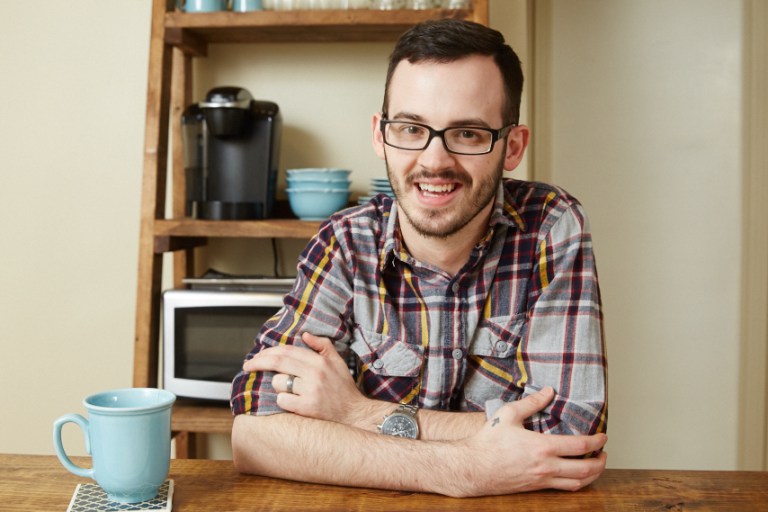Continuing an initiative that began last year, we are sharing stories from DDW patient advocates. Patient advocates are select DDW attendees (patient blogger, reporters) who take news and themes from the meeting each year and are able to share it back with their respective communities. They have the unique ability to sort through some of the complex medical terminology and relay vital information and updates back to patients in order to support and empower them through their long — and oftentimes confusing — GI journey.
Aaron Blocker, our first advocate to be featured this year, was diagnosed with Crohn’s Disease in 2009. Up until his diagnosis, he had scarcely heard of the disease and had never met anyone with it. He describes his journey to diagnosis as a long and hard one. At the age of 17, his disease was not explained to him properly and — like many other patients diagnosed in their youth — he felt lost and alone. These feelings of confusion and isolation motivated Aaron to start a Facebook page entitled “Support Crohn’s Disease and Ulcerative Colitis” as a way to meet other patients and potentially prevent them from experiencing some of the same pitfalls as he did:
“My Facebook page grew rapidly, and over time I realized that I had the opportunity to try and make a difference for anyone affected by IBD. I now have a website, http://supportibd.com/, along with my Facebook page, where I am dedicated to providing support, encouragement, and education to anyone facing IBD. On top of that, I am also a graduate student pursuing a degree in Biomedical Research, using my background in science to try and help educate the community on current IBD topics and research. I think using my story and journey with IBD, along with my research career path, to try and help others has been extremely beneficial for myself. Being able to also advocate for other patients is amazing.”
Q: As a patient advocate, why is it important for you to attend DDW? How did you hear about it, and what prompted you to attend for your first time?
A: As a patient advocate, I try my best to stay up to date on current IBD topics including research, new medications, insurance developments, etc. Attending a conference like DDW is a great way to learn new information and educate myself further, and helps me to be a better patient advocate for the community. I take patient advocacy very seriously, and I think doing everything that I can to stay up-to-date on IBD is critical. My background ins cience helps me understand a lot of the research that is presented at DDW. It’s helpful because I can then translate it and disseminate that information to the IBD community. As a patient, it gives me hope to see the amazing work going into IBD and digestive diseases as a whole, and being able to attend DDW allows me to show the community then that there are very smart, amazing people trying to make IBD better for us.
I had heard of DDW a couple of years ago through some of the advocacy work I was doing, but never had the means of attending. I thought it would be great as a patient advocate to go to a meeting of this size to learn more about IBD and become a better advocate. When I had the opportunity earlier this year to attend, I jumped on it because I knew it would be a fantastic conference and help my efforts as an advocate, which it very much did, and I look forward to returning and strengthening the patient advocate presence and voice at DDW.
Q: The goal for this article series is to keep patients involved. What advice can you give to them on how to follow along during DDW and stay/become more informed?
A: Following along with DDW is fairly easy through Social Media. There is always a hashtag specifically for the conference that allows anyone to search it and follow along with all the updates. There are a lot of medical professionals on Twitter who actively tweet during the conference. There are also many patient advocates who attend which is a unique way for other patients to follow along because they add a perspective to the conference and put out information that we learn. We know how to get that information out to the community on social media in a way they can relate to and understand.
Social Media is a HUGE part of advocacy. It is a way for us as patients and advocates to reach the community in a broad sense from all over the world and provide the support they may not get locally. Social media allows us to connect with patients, get out information to them quickly and make a personal connection to them as well.
Keep up with Aaron and his patient advocacy efforts by visiting his blog at supportibd.com/ or following him on Twitter as @AaronBlockerIBD, Facebook as SupportIBD, and Instagram as Aaron_Blocker.


